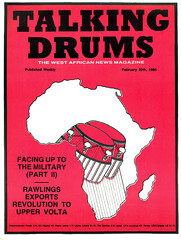An Opportunity Lost to Expose the Military
Ben Mensah
The future is very unpredictable for both Ghanaians and Nigerians. But whenever the opportunity presents itself again, let the current Argentina lesson not be lost on the civilians who will take over from the military.A country that dared to engage Great Britain in a war over the legal status of the Falklands must possess a certain level of affluence which places it far and above any of the West African countries where priority targets of a national struggle ought to be poverty, hunger, disease, squalor, etc.
Hence it will be unfair to draw comparisons between developments in Argentina and West Africa and conclude that what happens in one area should necessarily happen in the other.
But that also does not mean that the relevance of the history of that Latin American country, dominated by military coups and efforts of the civilians in recent days to extricate themselves from military bondage should not be taken note of as a useful lesson to all who are opposed to the acceleration in the transformation of the West African region into military dictatorships.
The last round of military rule in Argentina lasted from 1976 till 10th December 1983, when following the defeat of the country in the Falklands war, pressure mounted on the military to hand over power to the civilians. President Raul Alfonsin who subsequently took over, after victory in the general elections immediately set out to prosecute his military predecessors for Those prosecutions having barely begun, the President has again set up both military and civilian courts to investigate and try officers and their civilian cohorts involved in economic crimes and irregularities.
But President Alfonsin does not only aim to rake the muck of the past so as to give the impression that he is only after the blood of the military. A national prosecutor for administrative investigations has been appointed to act as the government's watchdog.
All these measures appear very simple to implement but they also have the potential of incensing the ousted soldiers into staging a desperate comeback through a military coup. And this is where President Alfonsin proffers a lesson.
He has plucked the necessary courage to prove to all Argentinians that their military had not fared better than the civilian administration they ousted. After the authentication of the econ- omic evils of the military officers and their blatant abuse of human rights, let them come back to the political scene to advance fresh evidence of their superiority over the civilian administrators.
Therein lie the reasoning and strength of President Alfonsin in dealing a deadly blow to the threat posed by the military to parliamentary democracy in Argentina.
In West Africa the treachery of the military in overthrowing constitutional governments they were supposed to defend has persisted mainly due to the conspiracy of the civilian politicians not to expose the wrongs of the preceding military regime.
In some cases too the civilians who may have played leading roles in the preceding military regimes dread their own shadows and therefore fail to institute probes into the past.
In 1978 the military regime of the late General Acheampong was so hated that there was hardly a day Ghanaian professionals, students and other groups did not vent their feelings through demonstrations, withdrawal of services etc.
Yet General Acheampong, like most military regimes, survived every counter coup attempt until a palace coup removed him in 1978. Even then the pressure was still on for the military to hand over to a civilian constitutional government. This opportunity was however hijacked in 1979 by Air Force Officer, Flt-Lt Rawlings whose Armed Forces Revolutionary Council wasted no time in executing members of the past military regime.
Their method of establishing the guilt of the military officers and the nature of punishment meted out were so unconventional and arbitrary that instead of winning support Flt-Lt Rawlings and his team on the AFRC looked like a band of irresponsible and bloodthirsty soldiers.
Through a coincidence of events Flt- Lt Rawlings who finds himself at the helm of affairs in Ghana today has acknowledged his inhuman methods of punishing the wrong doers in 1979 and has therefore granted his convicts pardon even though he had forbidden his civilian successors a similar right to do that between 1979 and 1981.
Aside of this development, the question to ask is, if Rawlings had not appeared on the political scene and Generals Acheampong and Akuffo had handed over power to a constitutional government would the civilians have had the guts to punish them for their economic crimes and human rights violations?
BLUNDERS
In 1979 after Dr Hilla Limann came to power, he bungled a priceless opportunity to expose the actions of the military which would have discredited them forever. The human rights violators of the Rawlings AFRC and Acheampong's economic crimes, properly investigated and prosecuted, would have shown the public the real worth of the military.On the Nigerian front one feels sorry for President Shehu Shagari who according to Dr Umaru Dikko, his Communications and Aviation Minister, decided in 1979 that the future was far more important than the past and therefore resisted all attempts to lay bare what he had inherited, including the wrongdoings of the military predecessors.
LESSON
That was an opportunity lost and may never return as is the case threatened by Flt Lt Rawlings who does not dream of handing over power to any civilian politician.In Nigeria, however, General Buhari has not said he would not hand over power back to the civilians. That also does not mean that he is going to do that either in the immediate future.
All these make the future very unpredictable for both Ghanaians and Nigerians. But whenever the opportunity presents itself again, let the current Argentinian lesson not be lost on the civilians who will take over from them.

